Impact of Empowerment, Teams, and Change on Performance
VerifiedAdded on 2023/01/17
|17
|3927
|32
Report
AI Summary
This report provides a critical review of managerial self-development, focusing on the principles of empowerment, teams, and positive change and their impact on organizational performance. It begins by examining empowerment, discussing its psychological and structural dimensions, and how it influences employee self-efficiency and organizational outcomes. The report then analyzes the impact of teams on performance, highlighting characteristics of high-performing teams, including leadership, conflict resolution, and motivation. Finally, it explores positive change, detailing its drivers and effects on employees and the organization. The report emphasizes the importance of employee valuation, leadership vision, delegation, and team dynamics in achieving organizational goals. It also discusses the disadvantages of empowerment and barriers to effective teamwork.
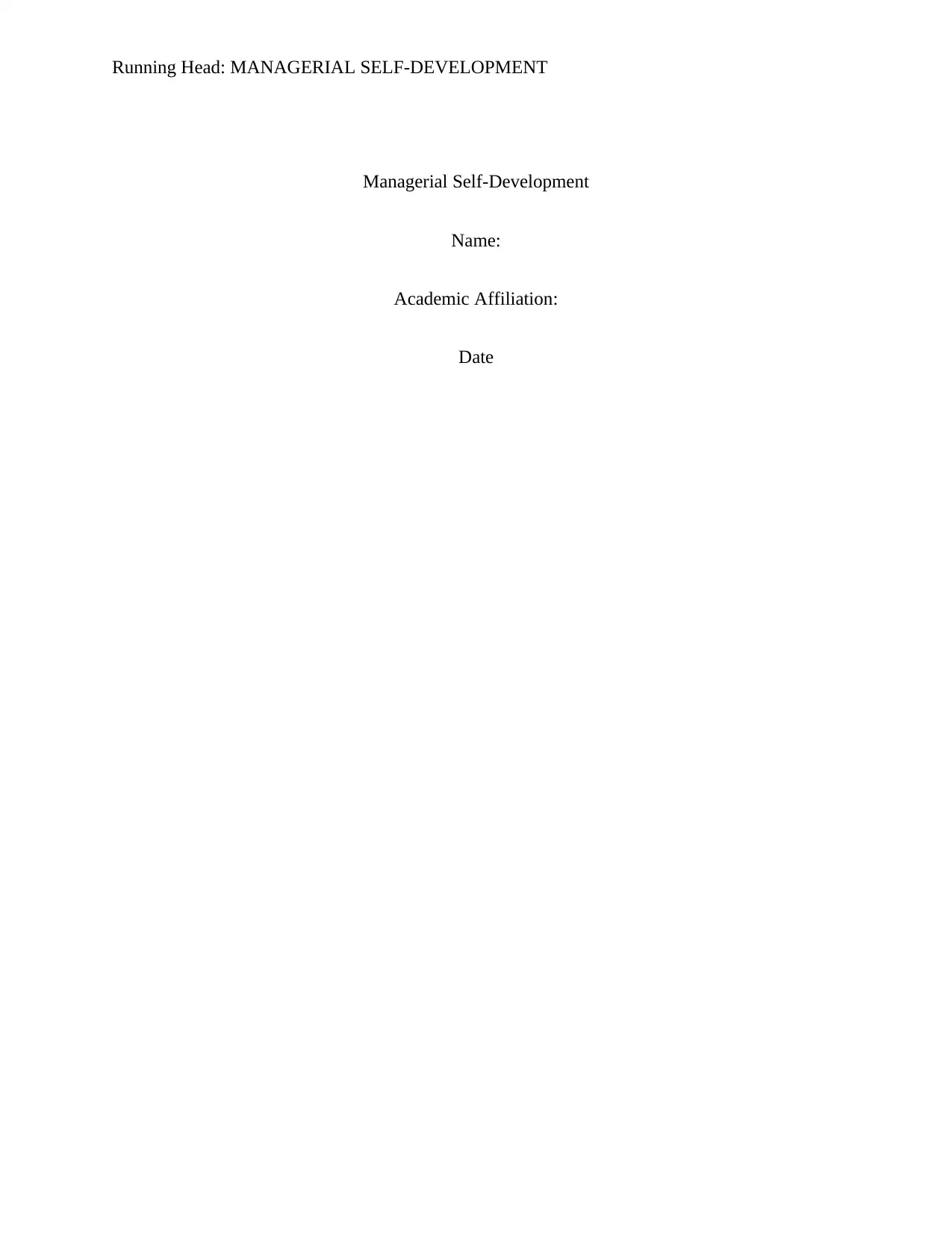
Running Head: MANAGERIAL SELF-DEVELOPMENT
Managerial Self-Development
Name:
Academic Affiliation:
Date
Managerial Self-Development
Name:
Academic Affiliation:
Date
Paraphrase This Document
Need a fresh take? Get an instant paraphrase of this document with our AI Paraphraser
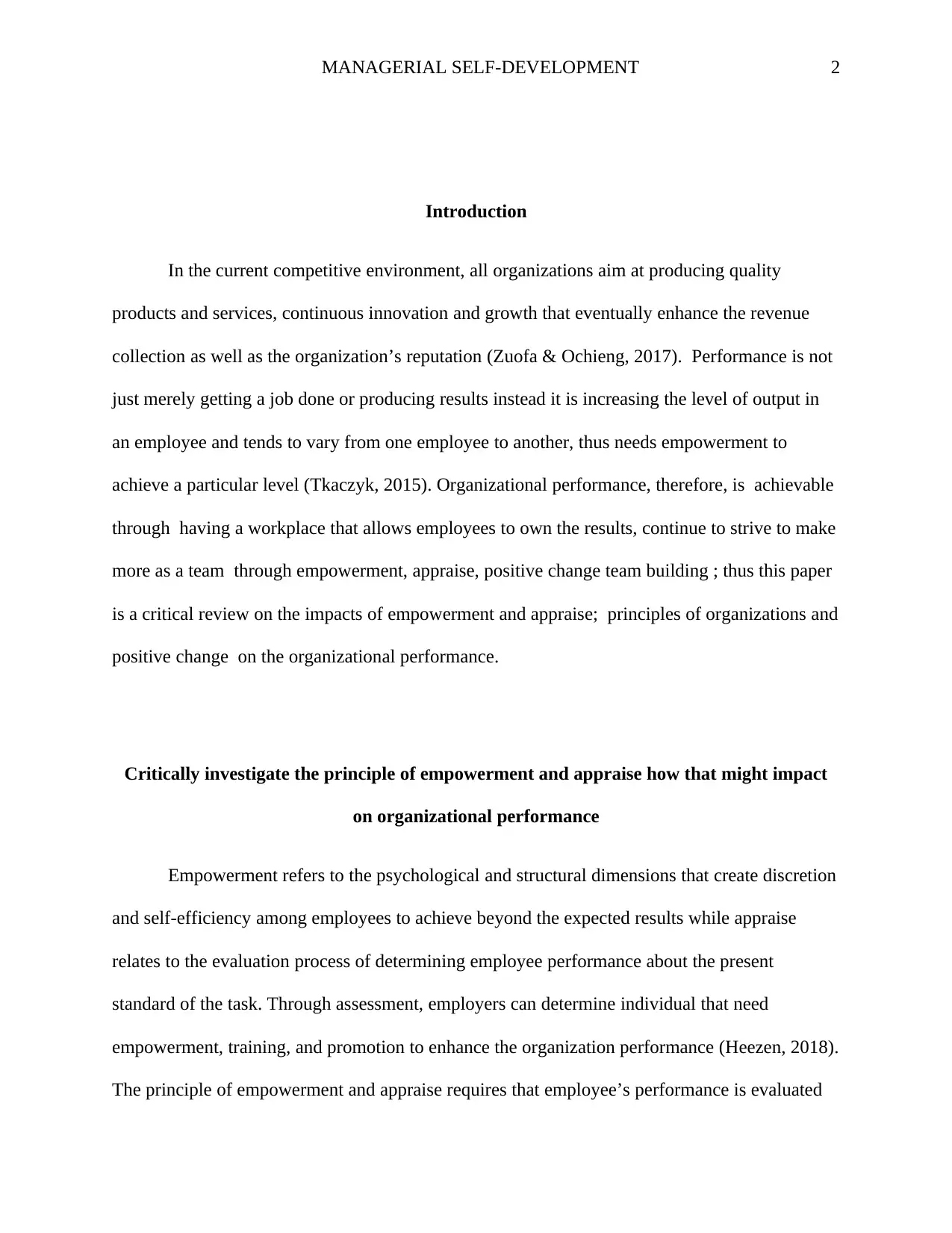
MANAGERIAL SELF-DEVELOPMENT 2
Introduction
In the current competitive environment, all organizations aim at producing quality
products and services, continuous innovation and growth that eventually enhance the revenue
collection as well as the organization’s reputation (Zuofa & Ochieng, 2017). Performance is not
just merely getting a job done or producing results instead it is increasing the level of output in
an employee and tends to vary from one employee to another, thus needs empowerment to
achieve a particular level (Tkaczyk, 2015). Organizational performance, therefore, is achievable
through having a workplace that allows employees to own the results, continue to strive to make
more as a team through empowerment, appraise, positive change team building ; thus this paper
is a critical review on the impacts of empowerment and appraise; principles of organizations and
positive change on the organizational performance.
Critically investigate the principle of empowerment and appraise how that might impact
on organizational performance
Empowerment refers to the psychological and structural dimensions that create discretion
and self-efficiency among employees to achieve beyond the expected results while appraise
relates to the evaluation process of determining employee performance about the present
standard of the task. Through assessment, employers can determine individual that need
empowerment, training, and promotion to enhance the organization performance (Heezen, 2018).
The principle of empowerment and appraise requires that employee’s performance is evaluated
Introduction
In the current competitive environment, all organizations aim at producing quality
products and services, continuous innovation and growth that eventually enhance the revenue
collection as well as the organization’s reputation (Zuofa & Ochieng, 2017). Performance is not
just merely getting a job done or producing results instead it is increasing the level of output in
an employee and tends to vary from one employee to another, thus needs empowerment to
achieve a particular level (Tkaczyk, 2015). Organizational performance, therefore, is achievable
through having a workplace that allows employees to own the results, continue to strive to make
more as a team through empowerment, appraise, positive change team building ; thus this paper
is a critical review on the impacts of empowerment and appraise; principles of organizations and
positive change on the organizational performance.
Critically investigate the principle of empowerment and appraise how that might impact
on organizational performance
Empowerment refers to the psychological and structural dimensions that create discretion
and self-efficiency among employees to achieve beyond the expected results while appraise
relates to the evaluation process of determining employee performance about the present
standard of the task. Through assessment, employers can determine individual that need
empowerment, training, and promotion to enhance the organization performance (Heezen, 2018).
The principle of empowerment and appraise requires that employee’s performance is evaluated
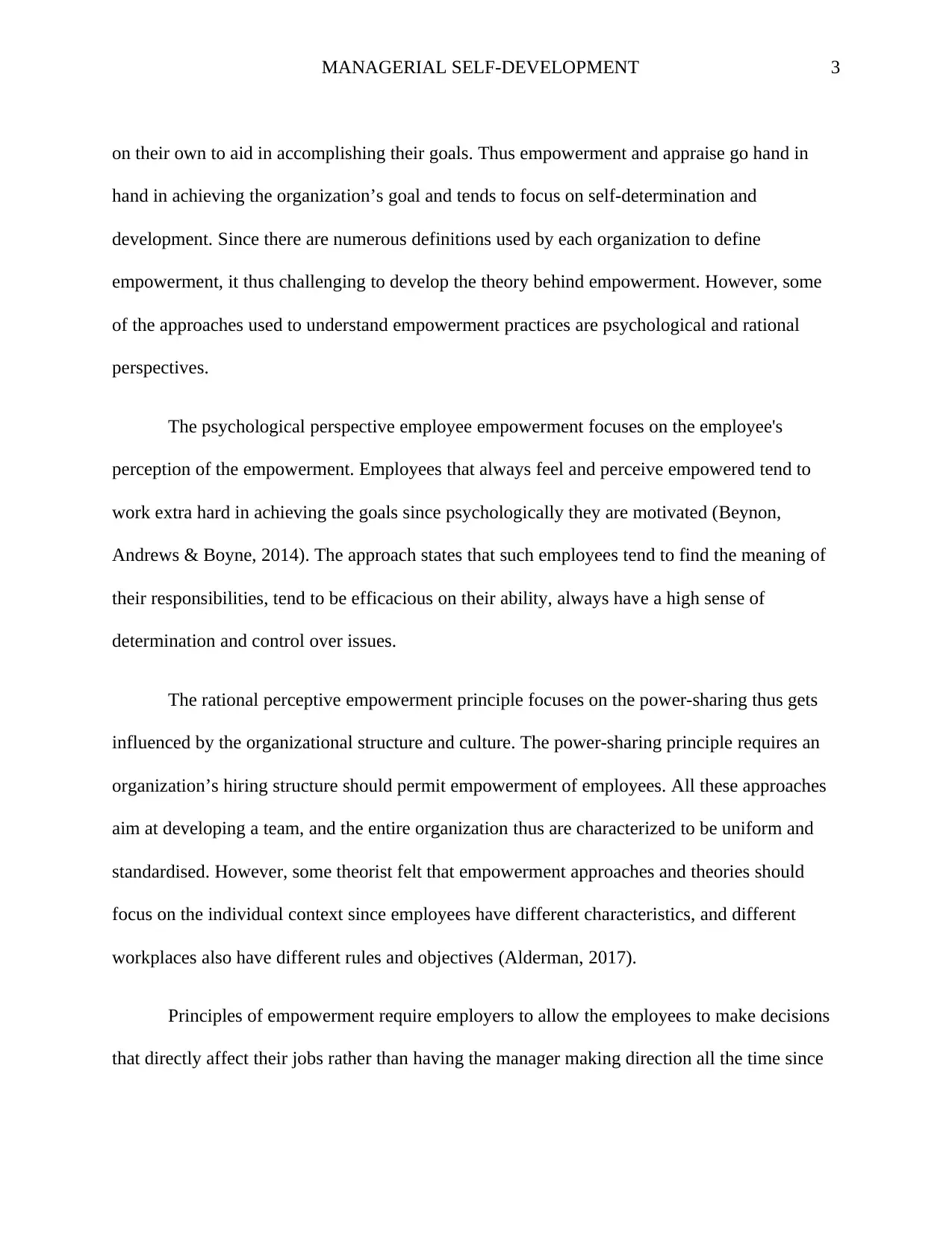
MANAGERIAL SELF-DEVELOPMENT 3
on their own to aid in accomplishing their goals. Thus empowerment and appraise go hand in
hand in achieving the organization’s goal and tends to focus on self-determination and
development. Since there are numerous definitions used by each organization to define
empowerment, it thus challenging to develop the theory behind empowerment. However, some
of the approaches used to understand empowerment practices are psychological and rational
perspectives.
The psychological perspective employee empowerment focuses on the employee's
perception of the empowerment. Employees that always feel and perceive empowered tend to
work extra hard in achieving the goals since psychologically they are motivated (Beynon,
Andrews & Boyne, 2014). The approach states that such employees tend to find the meaning of
their responsibilities, tend to be efficacious on their ability, always have a high sense of
determination and control over issues.
The rational perceptive empowerment principle focuses on the power-sharing thus gets
influenced by the organizational structure and culture. The power-sharing principle requires an
organization’s hiring structure should permit empowerment of employees. All these approaches
aim at developing a team, and the entire organization thus are characterized to be uniform and
standardised. However, some theorist felt that empowerment approaches and theories should
focus on the individual context since employees have different characteristics, and different
workplaces also have different rules and objectives (Alderman, 2017).
Principles of empowerment require employers to allow the employees to make decisions
that directly affect their jobs rather than having the manager making direction all the time since
on their own to aid in accomplishing their goals. Thus empowerment and appraise go hand in
hand in achieving the organization’s goal and tends to focus on self-determination and
development. Since there are numerous definitions used by each organization to define
empowerment, it thus challenging to develop the theory behind empowerment. However, some
of the approaches used to understand empowerment practices are psychological and rational
perspectives.
The psychological perspective employee empowerment focuses on the employee's
perception of the empowerment. Employees that always feel and perceive empowered tend to
work extra hard in achieving the goals since psychologically they are motivated (Beynon,
Andrews & Boyne, 2014). The approach states that such employees tend to find the meaning of
their responsibilities, tend to be efficacious on their ability, always have a high sense of
determination and control over issues.
The rational perceptive empowerment principle focuses on the power-sharing thus gets
influenced by the organizational structure and culture. The power-sharing principle requires an
organization’s hiring structure should permit empowerment of employees. All these approaches
aim at developing a team, and the entire organization thus are characterized to be uniform and
standardised. However, some theorist felt that empowerment approaches and theories should
focus on the individual context since employees have different characteristics, and different
workplaces also have different rules and objectives (Alderman, 2017).
Principles of empowerment require employers to allow the employees to make decisions
that directly affect their jobs rather than having the manager making direction all the time since
⊘ This is a preview!⊘
Do you want full access?
Subscribe today to unlock all pages.

Trusted by 1+ million students worldwide
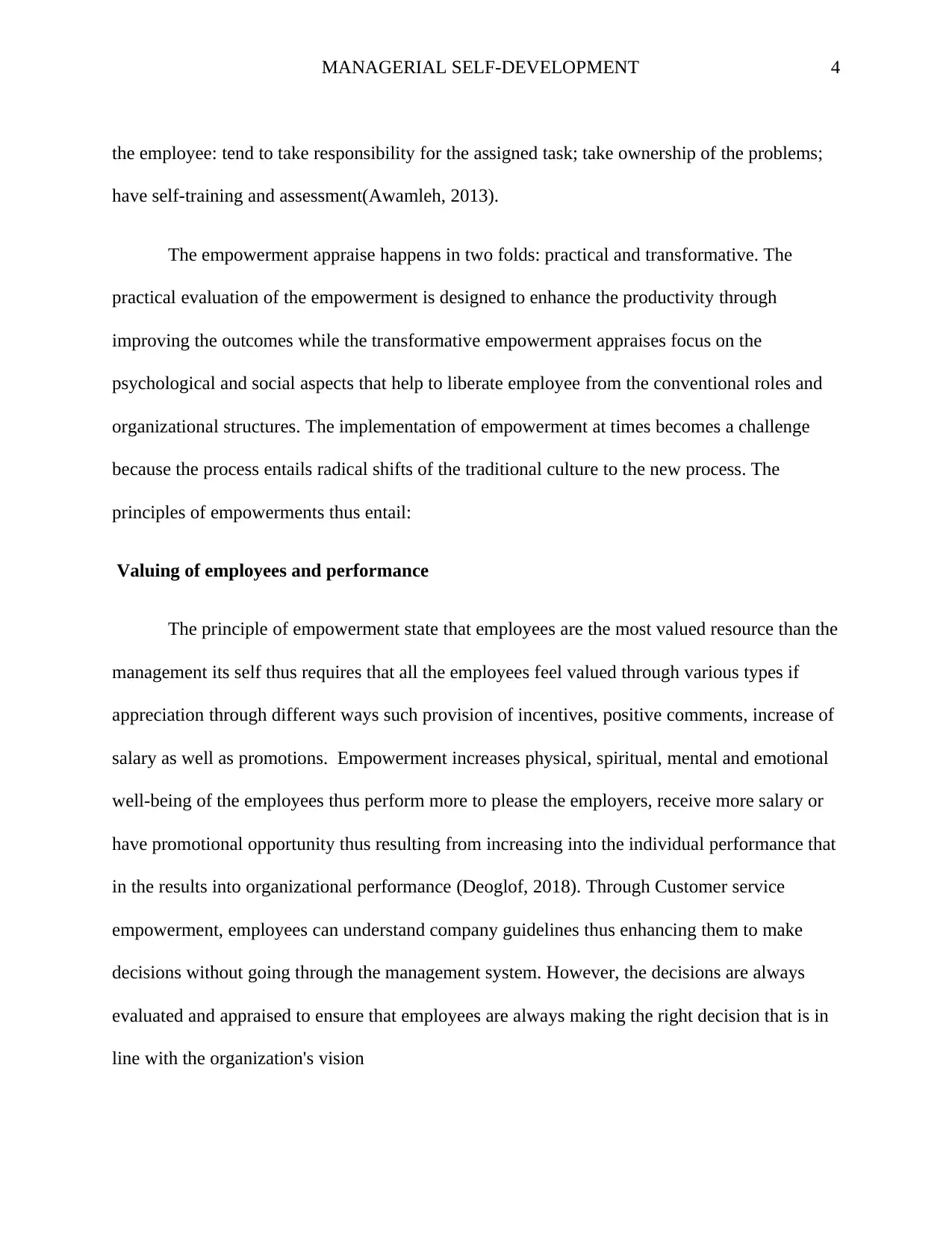
MANAGERIAL SELF-DEVELOPMENT 4
the employee: tend to take responsibility for the assigned task; take ownership of the problems;
have self-training and assessment(Awamleh, 2013).
The empowerment appraise happens in two folds: practical and transformative. The
practical evaluation of the empowerment is designed to enhance the productivity through
improving the outcomes while the transformative empowerment appraises focus on the
psychological and social aspects that help to liberate employee from the conventional roles and
organizational structures. The implementation of empowerment at times becomes a challenge
because the process entails radical shifts of the traditional culture to the new process. The
principles of empowerments thus entail:
Valuing of employees and performance
The principle of empowerment state that employees are the most valued resource than the
management its self thus requires that all the employees feel valued through various types if
appreciation through different ways such provision of incentives, positive comments, increase of
salary as well as promotions. Empowerment increases physical, spiritual, mental and emotional
well-being of the employees thus perform more to please the employers, receive more salary or
have promotional opportunity thus resulting from increasing into the individual performance that
in the results into organizational performance (Deoglof, 2018). Through Customer service
empowerment, employees can understand company guidelines thus enhancing them to make
decisions without going through the management system. However, the decisions are always
evaluated and appraised to ensure that employees are always making the right decision that is in
line with the organization's vision
the employee: tend to take responsibility for the assigned task; take ownership of the problems;
have self-training and assessment(Awamleh, 2013).
The empowerment appraise happens in two folds: practical and transformative. The
practical evaluation of the empowerment is designed to enhance the productivity through
improving the outcomes while the transformative empowerment appraises focus on the
psychological and social aspects that help to liberate employee from the conventional roles and
organizational structures. The implementation of empowerment at times becomes a challenge
because the process entails radical shifts of the traditional culture to the new process. The
principles of empowerments thus entail:
Valuing of employees and performance
The principle of empowerment state that employees are the most valued resource than the
management its self thus requires that all the employees feel valued through various types if
appreciation through different ways such provision of incentives, positive comments, increase of
salary as well as promotions. Empowerment increases physical, spiritual, mental and emotional
well-being of the employees thus perform more to please the employers, receive more salary or
have promotional opportunity thus resulting from increasing into the individual performance that
in the results into organizational performance (Deoglof, 2018). Through Customer service
empowerment, employees can understand company guidelines thus enhancing them to make
decisions without going through the management system. However, the decisions are always
evaluated and appraised to ensure that employees are always making the right decision that is in
line with the organization's vision
Paraphrase This Document
Need a fresh take? Get an instant paraphrase of this document with our AI Paraphraser
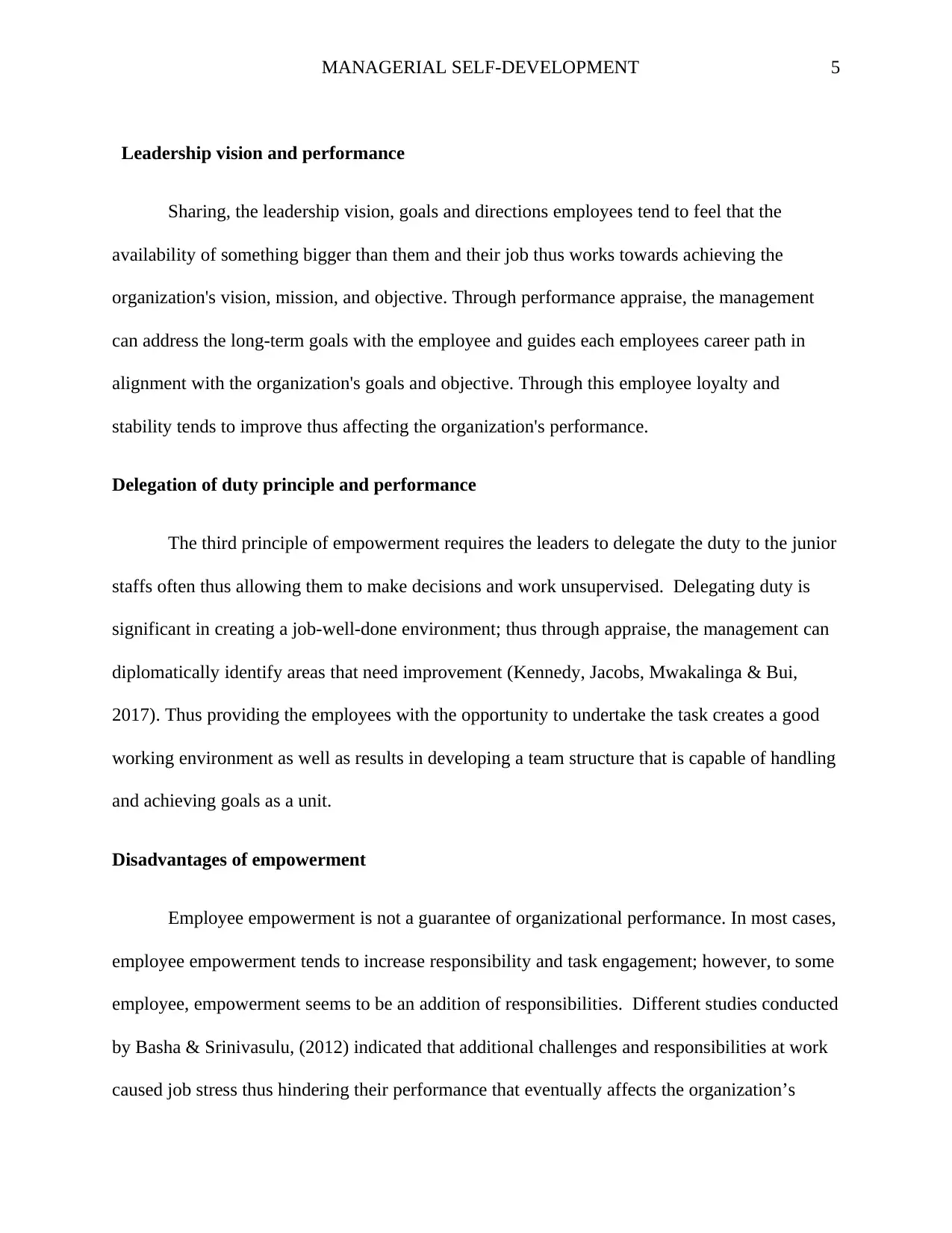
MANAGERIAL SELF-DEVELOPMENT 5
Leadership vision and performance
Sharing, the leadership vision, goals and directions employees tend to feel that the
availability of something bigger than them and their job thus works towards achieving the
organization's vision, mission, and objective. Through performance appraise, the management
can address the long-term goals with the employee and guides each employees career path in
alignment with the organization's goals and objective. Through this employee loyalty and
stability tends to improve thus affecting the organization's performance.
Delegation of duty principle and performance
The third principle of empowerment requires the leaders to delegate the duty to the junior
staffs often thus allowing them to make decisions and work unsupervised. Delegating duty is
significant in creating a job-well-done environment; thus through appraise, the management can
diplomatically identify areas that need improvement (Kennedy, Jacobs, Mwakalinga & Bui,
2017). Thus providing the employees with the opportunity to undertake the task creates a good
working environment as well as results in developing a team structure that is capable of handling
and achieving goals as a unit.
Disadvantages of empowerment
Employee empowerment is not a guarantee of organizational performance. In most cases,
employee empowerment tends to increase responsibility and task engagement; however, to some
employee, empowerment seems to be an addition of responsibilities. Different studies conducted
by Basha & Srinivasulu, (2012) indicated that additional challenges and responsibilities at work
caused job stress thus hindering their performance that eventually affects the organization’s
Leadership vision and performance
Sharing, the leadership vision, goals and directions employees tend to feel that the
availability of something bigger than them and their job thus works towards achieving the
organization's vision, mission, and objective. Through performance appraise, the management
can address the long-term goals with the employee and guides each employees career path in
alignment with the organization's goals and objective. Through this employee loyalty and
stability tends to improve thus affecting the organization's performance.
Delegation of duty principle and performance
The third principle of empowerment requires the leaders to delegate the duty to the junior
staffs often thus allowing them to make decisions and work unsupervised. Delegating duty is
significant in creating a job-well-done environment; thus through appraise, the management can
diplomatically identify areas that need improvement (Kennedy, Jacobs, Mwakalinga & Bui,
2017). Thus providing the employees with the opportunity to undertake the task creates a good
working environment as well as results in developing a team structure that is capable of handling
and achieving goals as a unit.
Disadvantages of empowerment
Employee empowerment is not a guarantee of organizational performance. In most cases,
employee empowerment tends to increase responsibility and task engagement; however, to some
employee, empowerment seems to be an addition of responsibilities. Different studies conducted
by Basha & Srinivasulu, (2012) indicated that additional challenges and responsibilities at work
caused job stress thus hindering their performance that eventually affects the organization’s
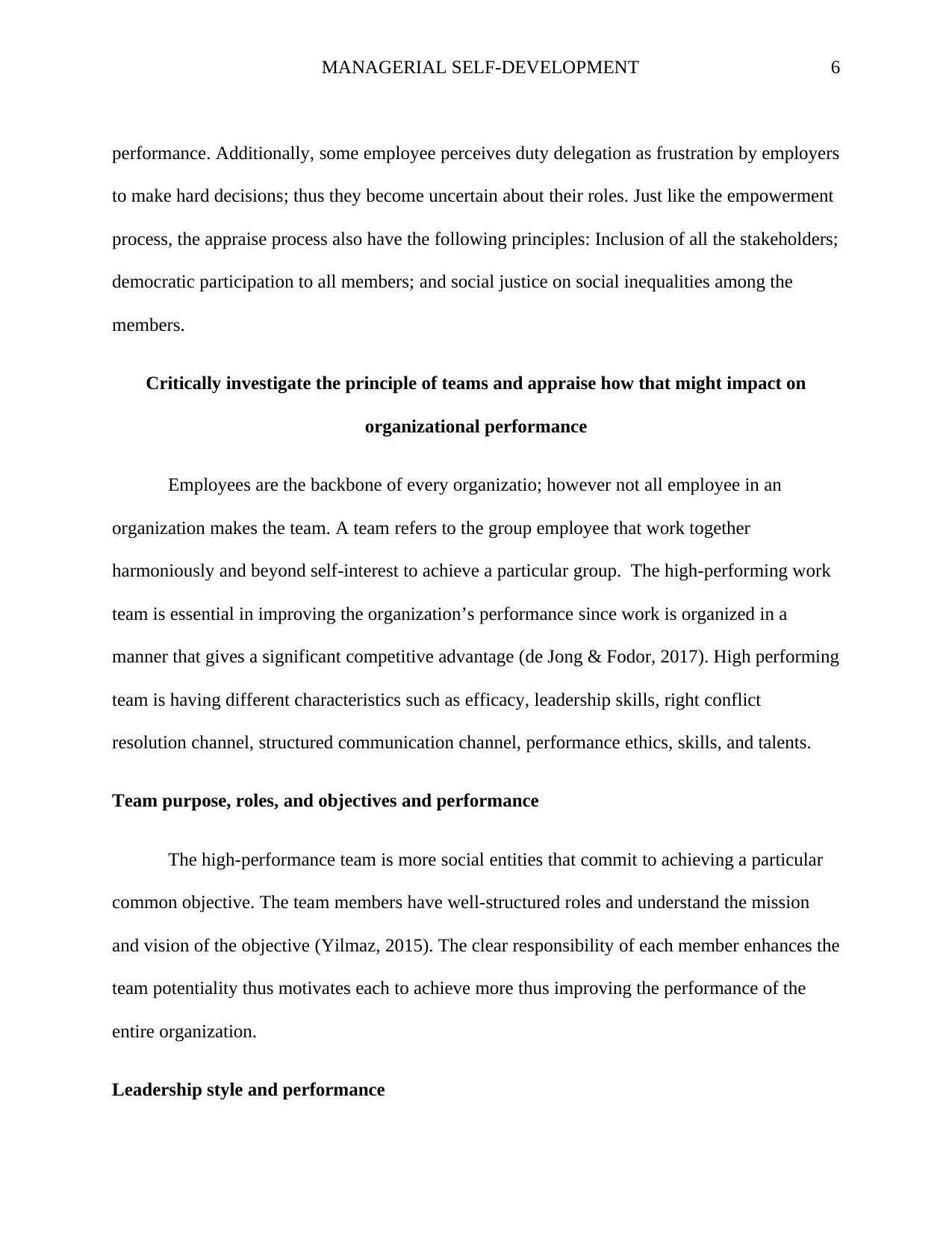
MANAGERIAL SELF-DEVELOPMENT 6
performance. Additionally, some employee perceives duty delegation as frustration by employers
to make hard decisions; thus they become uncertain about their roles. Just like the empowerment
process, the appraise process also have the following principles: Inclusion of all the stakeholders;
democratic participation to all members; and social justice on social inequalities among the
members.
Critically investigate the principle of teams and appraise how that might impact on
organizational performance
Employees are the backbone of every organizatio; however not all employee in an
organization makes the team. A team refers to the group employee that work together
harmoniously and beyond self-interest to achieve a particular group. The high-performing work
team is essential in improving the organization’s performance since work is organized in a
manner that gives a significant competitive advantage (de Jong & Fodor, 2017). High performing
team is having different characteristics such as efficacy, leadership skills, right conflict
resolution channel, structured communication channel, performance ethics, skills, and talents.
Team purpose, roles, and objectives and performance
The high-performance team is more social entities that commit to achieving a particular
common objective. The team members have well-structured roles and understand the mission
and vision of the objective (Yilmaz, 2015). The clear responsibility of each member enhances the
team potentiality thus motivates each to achieve more thus improving the performance of the
entire organization.
Leadership style and performance
performance. Additionally, some employee perceives duty delegation as frustration by employers
to make hard decisions; thus they become uncertain about their roles. Just like the empowerment
process, the appraise process also have the following principles: Inclusion of all the stakeholders;
democratic participation to all members; and social justice on social inequalities among the
members.
Critically investigate the principle of teams and appraise how that might impact on
organizational performance
Employees are the backbone of every organizatio; however not all employee in an
organization makes the team. A team refers to the group employee that work together
harmoniously and beyond self-interest to achieve a particular group. The high-performing work
team is essential in improving the organization’s performance since work is organized in a
manner that gives a significant competitive advantage (de Jong & Fodor, 2017). High performing
team is having different characteristics such as efficacy, leadership skills, right conflict
resolution channel, structured communication channel, performance ethics, skills, and talents.
Team purpose, roles, and objectives and performance
The high-performance team is more social entities that commit to achieving a particular
common objective. The team members have well-structured roles and understand the mission
and vision of the objective (Yilmaz, 2015). The clear responsibility of each member enhances the
team potentiality thus motivates each to achieve more thus improving the performance of the
entire organization.
Leadership style and performance
⊘ This is a preview!⊘
Do you want full access?
Subscribe today to unlock all pages.

Trusted by 1+ million students worldwide
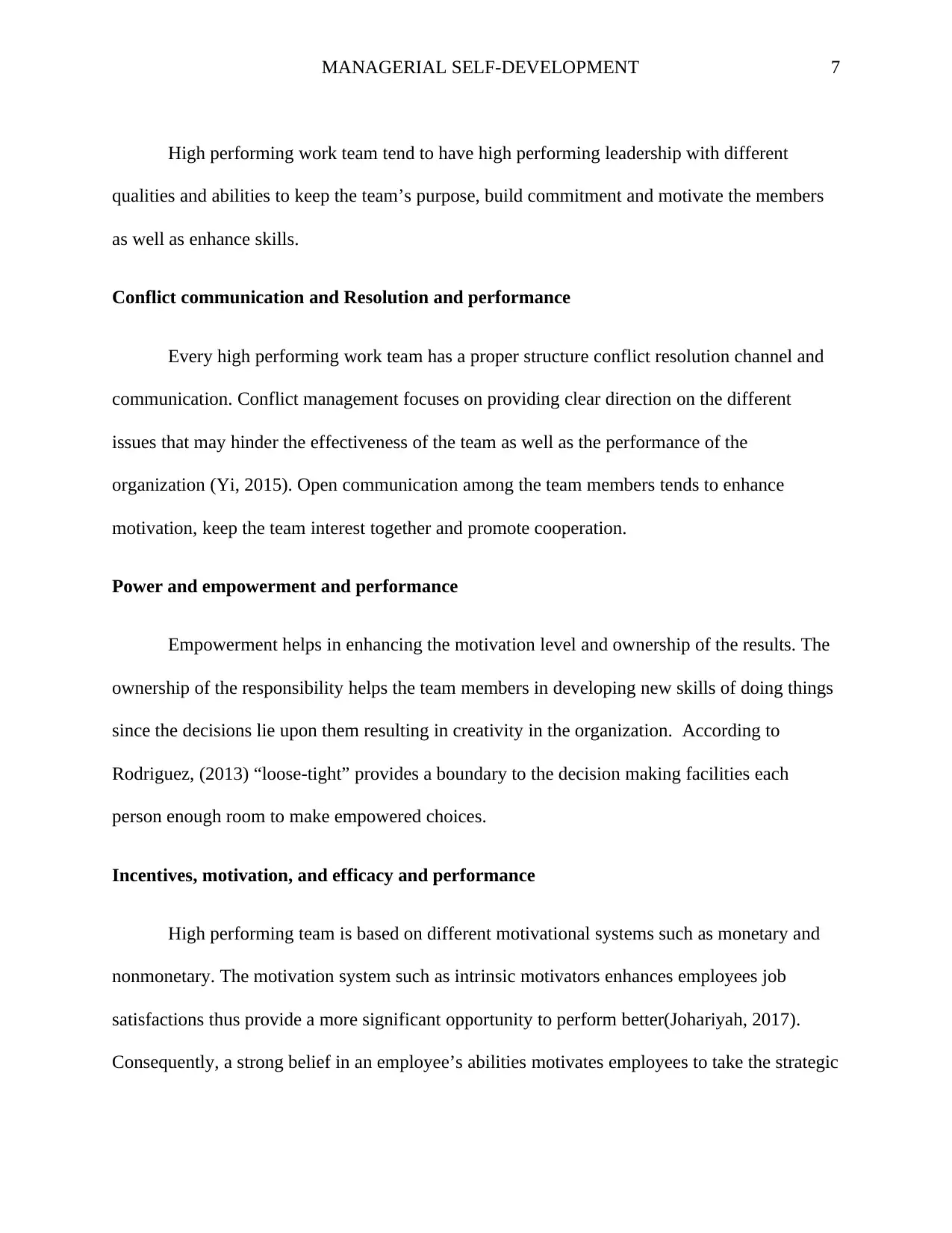
MANAGERIAL SELF-DEVELOPMENT 7
High performing work team tend to have high performing leadership with different
qualities and abilities to keep the team’s purpose, build commitment and motivate the members
as well as enhance skills.
Conflict communication and Resolution and performance
Every high performing work team has a proper structure conflict resolution channel and
communication. Conflict management focuses on providing clear direction on the different
issues that may hinder the effectiveness of the team as well as the performance of the
organization (Yi, 2015). Open communication among the team members tends to enhance
motivation, keep the team interest together and promote cooperation.
Power and empowerment and performance
Empowerment helps in enhancing the motivation level and ownership of the results. The
ownership of the responsibility helps the team members in developing new skills of doing things
since the decisions lie upon them resulting in creativity in the organization. According to
Rodriguez, (2013) “loose-tight” provides a boundary to the decision making facilities each
person enough room to make empowered choices.
Incentives, motivation, and efficacy and performance
High performing team is based on different motivational systems such as monetary and
nonmonetary. The motivation system such as intrinsic motivators enhances employees job
satisfactions thus provide a more significant opportunity to perform better(Johariyah, 2017).
Consequently, a strong belief in an employee’s abilities motivates employees to take the strategic
High performing work team tend to have high performing leadership with different
qualities and abilities to keep the team’s purpose, build commitment and motivate the members
as well as enhance skills.
Conflict communication and Resolution and performance
Every high performing work team has a proper structure conflict resolution channel and
communication. Conflict management focuses on providing clear direction on the different
issues that may hinder the effectiveness of the team as well as the performance of the
organization (Yi, 2015). Open communication among the team members tends to enhance
motivation, keep the team interest together and promote cooperation.
Power and empowerment and performance
Empowerment helps in enhancing the motivation level and ownership of the results. The
ownership of the responsibility helps the team members in developing new skills of doing things
since the decisions lie upon them resulting in creativity in the organization. According to
Rodriguez, (2013) “loose-tight” provides a boundary to the decision making facilities each
person enough room to make empowered choices.
Incentives, motivation, and efficacy and performance
High performing team is based on different motivational systems such as monetary and
nonmonetary. The motivation system such as intrinsic motivators enhances employees job
satisfactions thus provide a more significant opportunity to perform better(Johariyah, 2017).
Consequently, a strong belief in an employee’s abilities motivates employees to take the strategic
Paraphrase This Document
Need a fresh take? Get an instant paraphrase of this document with our AI Paraphraser
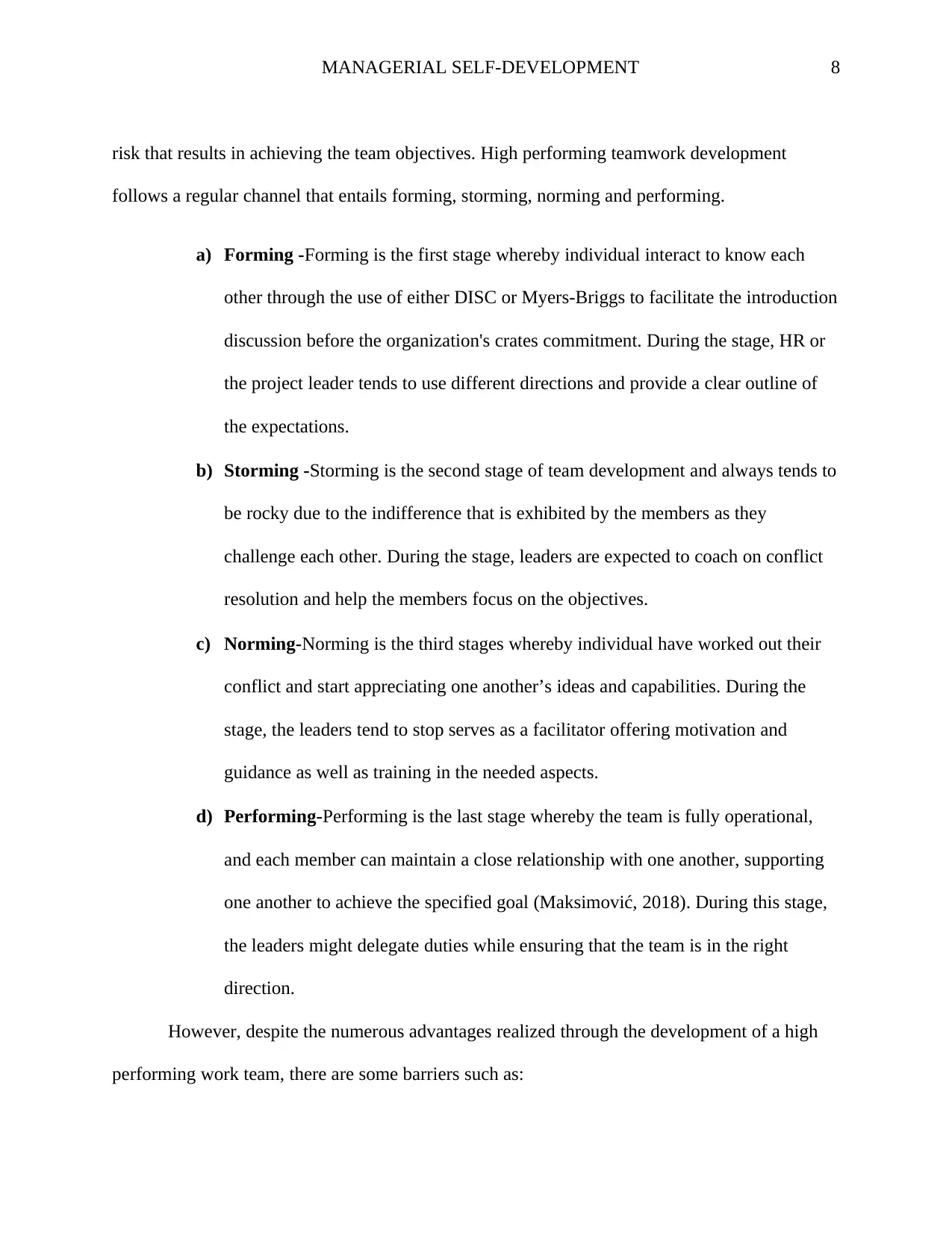
MANAGERIAL SELF-DEVELOPMENT 8
risk that results in achieving the team objectives. High performing teamwork development
follows a regular channel that entails forming, storming, norming and performing.
a) Forming -Forming is the first stage whereby individual interact to know each
other through the use of either DISC or Myers-Briggs to facilitate the introduction
discussion before the organization's crates commitment. During the stage, HR or
the project leader tends to use different directions and provide a clear outline of
the expectations.
b) Storming -Storming is the second stage of team development and always tends to
be rocky due to the indifference that is exhibited by the members as they
challenge each other. During the stage, leaders are expected to coach on conflict
resolution and help the members focus on the objectives.
c) Norming-Norming is the third stages whereby individual have worked out their
conflict and start appreciating one another’s ideas and capabilities. During the
stage, the leaders tend to stop serves as a facilitator offering motivation and
guidance as well as training in the needed aspects.
d) Performing-Performing is the last stage whereby the team is fully operational,
and each member can maintain a close relationship with one another, supporting
one another to achieve the specified goal (Maksimović, 2018). During this stage,
the leaders might delegate duties while ensuring that the team is in the right
direction.
However, despite the numerous advantages realized through the development of a high
performing work team, there are some barriers such as:
risk that results in achieving the team objectives. High performing teamwork development
follows a regular channel that entails forming, storming, norming and performing.
a) Forming -Forming is the first stage whereby individual interact to know each
other through the use of either DISC or Myers-Briggs to facilitate the introduction
discussion before the organization's crates commitment. During the stage, HR or
the project leader tends to use different directions and provide a clear outline of
the expectations.
b) Storming -Storming is the second stage of team development and always tends to
be rocky due to the indifference that is exhibited by the members as they
challenge each other. During the stage, leaders are expected to coach on conflict
resolution and help the members focus on the objectives.
c) Norming-Norming is the third stages whereby individual have worked out their
conflict and start appreciating one another’s ideas and capabilities. During the
stage, the leaders tend to stop serves as a facilitator offering motivation and
guidance as well as training in the needed aspects.
d) Performing-Performing is the last stage whereby the team is fully operational,
and each member can maintain a close relationship with one another, supporting
one another to achieve the specified goal (Maksimović, 2018). During this stage,
the leaders might delegate duties while ensuring that the team is in the right
direction.
However, despite the numerous advantages realized through the development of a high
performing work team, there are some barriers such as:
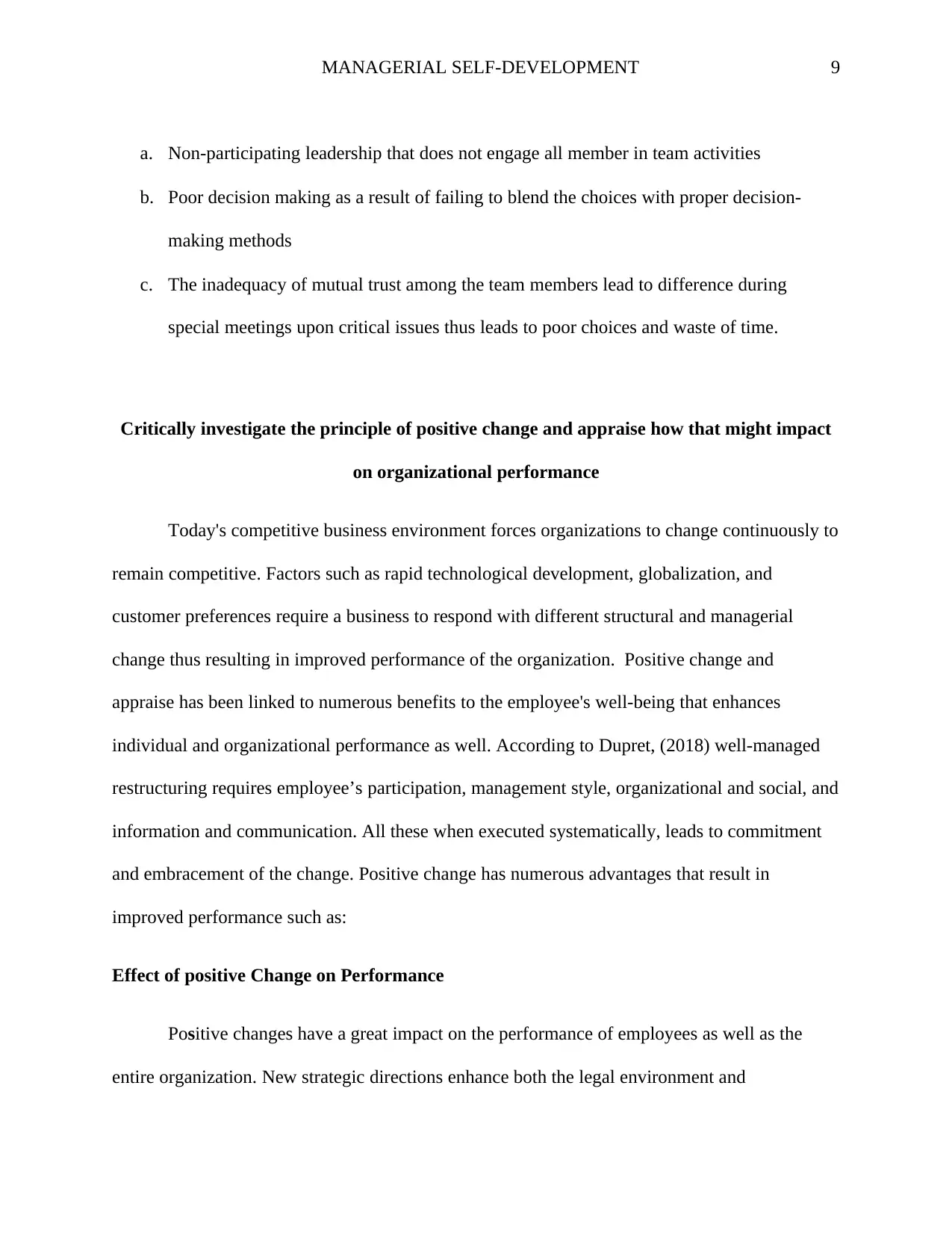
MANAGERIAL SELF-DEVELOPMENT 9
a. Non-participating leadership that does not engage all member in team activities
b. Poor decision making as a result of failing to blend the choices with proper decision-
making methods
c. The inadequacy of mutual trust among the team members lead to difference during
special meetings upon critical issues thus leads to poor choices and waste of time.
Critically investigate the principle of positive change and appraise how that might impact
on organizational performance
Today's competitive business environment forces organizations to change continuously to
remain competitive. Factors such as rapid technological development, globalization, and
customer preferences require a business to respond with different structural and managerial
change thus resulting in improved performance of the organization. Positive change and
appraise has been linked to numerous benefits to the employee's well-being that enhances
individual and organizational performance as well. According to Dupret, (2018) well-managed
restructuring requires employee’s participation, management style, organizational and social, and
information and communication. All these when executed systematically, leads to commitment
and embracement of the change. Positive change has numerous advantages that result in
improved performance such as:
Effect of positive Change on Performance
Positive changes have a great impact on the performance of employees as well as the
entire organization. New strategic directions enhance both the legal environment and
a. Non-participating leadership that does not engage all member in team activities
b. Poor decision making as a result of failing to blend the choices with proper decision-
making methods
c. The inadequacy of mutual trust among the team members lead to difference during
special meetings upon critical issues thus leads to poor choices and waste of time.
Critically investigate the principle of positive change and appraise how that might impact
on organizational performance
Today's competitive business environment forces organizations to change continuously to
remain competitive. Factors such as rapid technological development, globalization, and
customer preferences require a business to respond with different structural and managerial
change thus resulting in improved performance of the organization. Positive change and
appraise has been linked to numerous benefits to the employee's well-being that enhances
individual and organizational performance as well. According to Dupret, (2018) well-managed
restructuring requires employee’s participation, management style, organizational and social, and
information and communication. All these when executed systematically, leads to commitment
and embracement of the change. Positive change has numerous advantages that result in
improved performance such as:
Effect of positive Change on Performance
Positive changes have a great impact on the performance of employees as well as the
entire organization. New strategic directions enhance both the legal environment and
⊘ This is a preview!⊘
Do you want full access?
Subscribe today to unlock all pages.

Trusted by 1+ million students worldwide
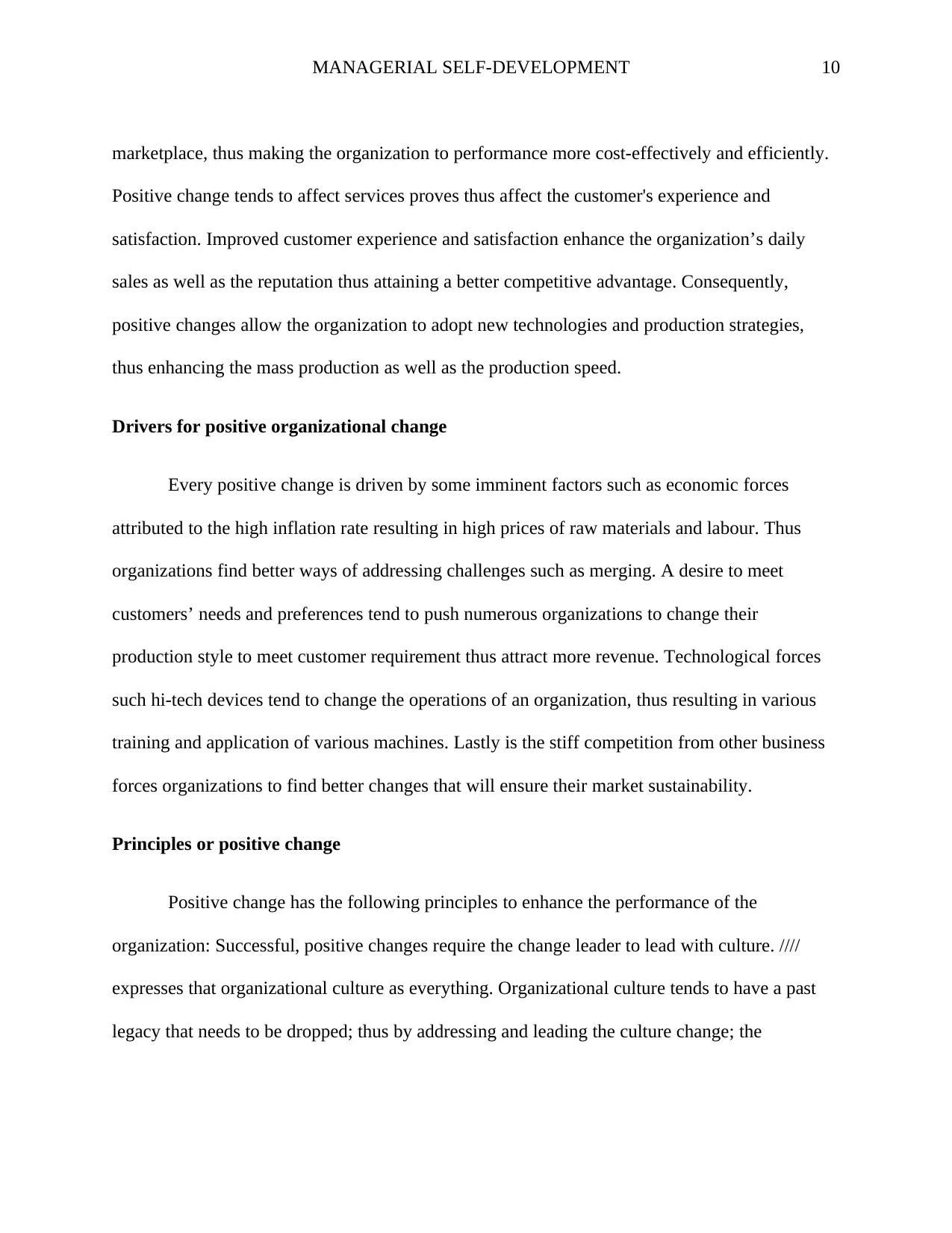
MANAGERIAL SELF-DEVELOPMENT 10
marketplace, thus making the organization to performance more cost-effectively and efficiently.
Positive change tends to affect services proves thus affect the customer's experience and
satisfaction. Improved customer experience and satisfaction enhance the organization’s daily
sales as well as the reputation thus attaining a better competitive advantage. Consequently,
positive changes allow the organization to adopt new technologies and production strategies,
thus enhancing the mass production as well as the production speed.
Drivers for positive organizational change
Every positive change is driven by some imminent factors such as economic forces
attributed to the high inflation rate resulting in high prices of raw materials and labour. Thus
organizations find better ways of addressing challenges such as merging. A desire to meet
customers’ needs and preferences tend to push numerous organizations to change their
production style to meet customer requirement thus attract more revenue. Technological forces
such hi-tech devices tend to change the operations of an organization, thus resulting in various
training and application of various machines. Lastly is the stiff competition from other business
forces organizations to find better changes that will ensure their market sustainability.
Principles or positive change
Positive change has the following principles to enhance the performance of the
organization: Successful, positive changes require the change leader to lead with culture. ////
expresses that organizational culture as everything. Organizational culture tends to have a past
legacy that needs to be dropped; thus by addressing and leading the culture change; the
marketplace, thus making the organization to performance more cost-effectively and efficiently.
Positive change tends to affect services proves thus affect the customer's experience and
satisfaction. Improved customer experience and satisfaction enhance the organization’s daily
sales as well as the reputation thus attaining a better competitive advantage. Consequently,
positive changes allow the organization to adopt new technologies and production strategies,
thus enhancing the mass production as well as the production speed.
Drivers for positive organizational change
Every positive change is driven by some imminent factors such as economic forces
attributed to the high inflation rate resulting in high prices of raw materials and labour. Thus
organizations find better ways of addressing challenges such as merging. A desire to meet
customers’ needs and preferences tend to push numerous organizations to change their
production style to meet customer requirement thus attract more revenue. Technological forces
such hi-tech devices tend to change the operations of an organization, thus resulting in various
training and application of various machines. Lastly is the stiff competition from other business
forces organizations to find better changes that will ensure their market sustainability.
Principles or positive change
Positive change has the following principles to enhance the performance of the
organization: Successful, positive changes require the change leader to lead with culture. ////
expresses that organizational culture as everything. Organizational culture tends to have a past
legacy that needs to be dropped; thus by addressing and leading the culture change; the
Paraphrase This Document
Need a fresh take? Get an instant paraphrase of this document with our AI Paraphraser
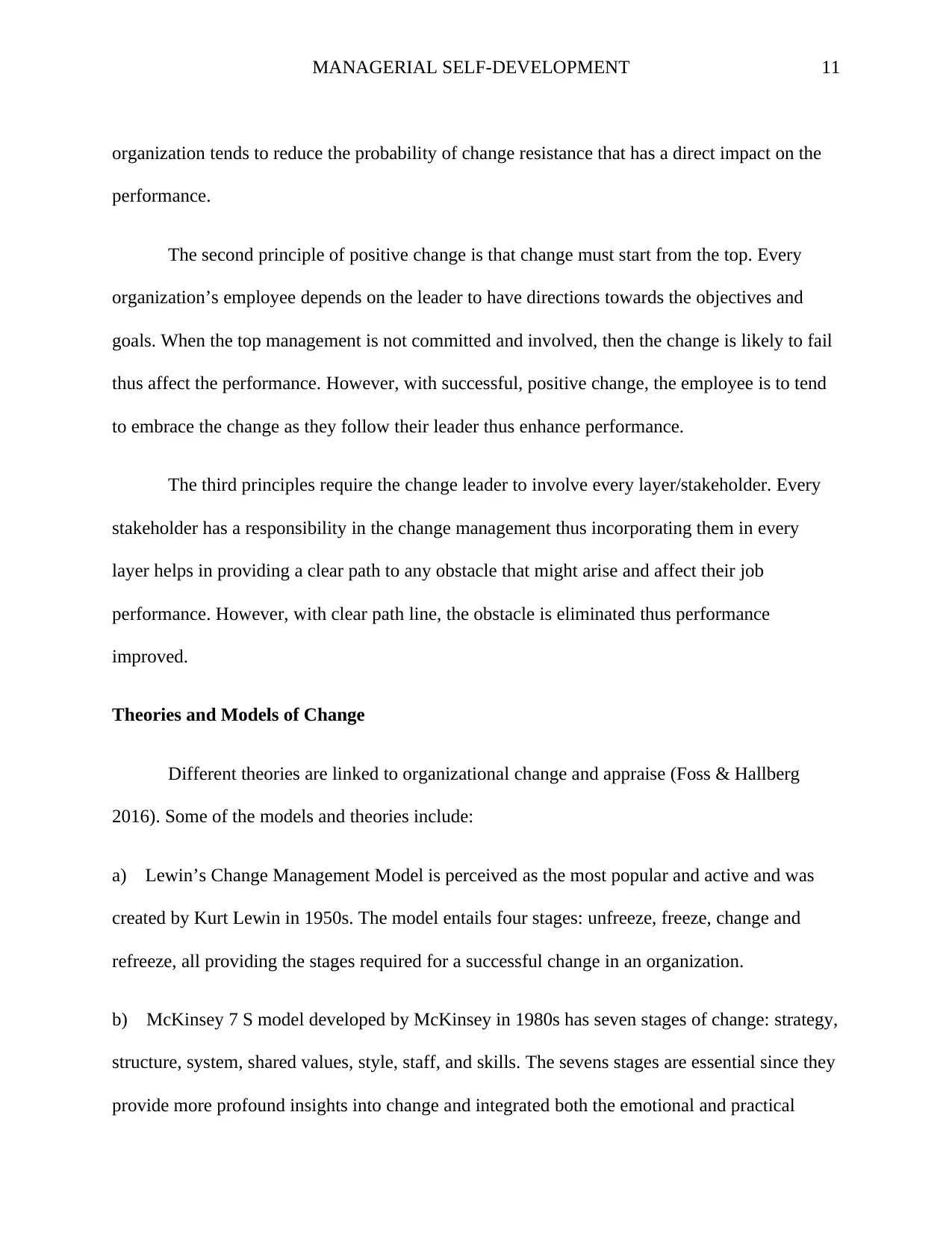
MANAGERIAL SELF-DEVELOPMENT 11
organization tends to reduce the probability of change resistance that has a direct impact on the
performance.
The second principle of positive change is that change must start from the top. Every
organization’s employee depends on the leader to have directions towards the objectives and
goals. When the top management is not committed and involved, then the change is likely to fail
thus affect the performance. However, with successful, positive change, the employee is to tend
to embrace the change as they follow their leader thus enhance performance.
The third principles require the change leader to involve every layer/stakeholder. Every
stakeholder has a responsibility in the change management thus incorporating them in every
layer helps in providing a clear path to any obstacle that might arise and affect their job
performance. However, with clear path line, the obstacle is eliminated thus performance
improved.
Theories and Models of Change
Different theories are linked to organizational change and appraise (Foss & Hallberg
2016). Some of the models and theories include:
a) Lewin’s Change Management Model is perceived as the most popular and active and was
created by Kurt Lewin in 1950s. The model entails four stages: unfreeze, freeze, change and
refreeze, all providing the stages required for a successful change in an organization.
b) McKinsey 7 S model developed by McKinsey in 1980s has seven stages of change: strategy,
structure, system, shared values, style, staff, and skills. The sevens stages are essential since they
provide more profound insights into change and integrated both the emotional and practical
organization tends to reduce the probability of change resistance that has a direct impact on the
performance.
The second principle of positive change is that change must start from the top. Every
organization’s employee depends on the leader to have directions towards the objectives and
goals. When the top management is not committed and involved, then the change is likely to fail
thus affect the performance. However, with successful, positive change, the employee is to tend
to embrace the change as they follow their leader thus enhance performance.
The third principles require the change leader to involve every layer/stakeholder. Every
stakeholder has a responsibility in the change management thus incorporating them in every
layer helps in providing a clear path to any obstacle that might arise and affect their job
performance. However, with clear path line, the obstacle is eliminated thus performance
improved.
Theories and Models of Change
Different theories are linked to organizational change and appraise (Foss & Hallberg
2016). Some of the models and theories include:
a) Lewin’s Change Management Model is perceived as the most popular and active and was
created by Kurt Lewin in 1950s. The model entails four stages: unfreeze, freeze, change and
refreeze, all providing the stages required for a successful change in an organization.
b) McKinsey 7 S model developed by McKinsey in 1980s has seven stages of change: strategy,
structure, system, shared values, style, staff, and skills. The sevens stages are essential since they
provide more profound insights into change and integrated both the emotional and practical
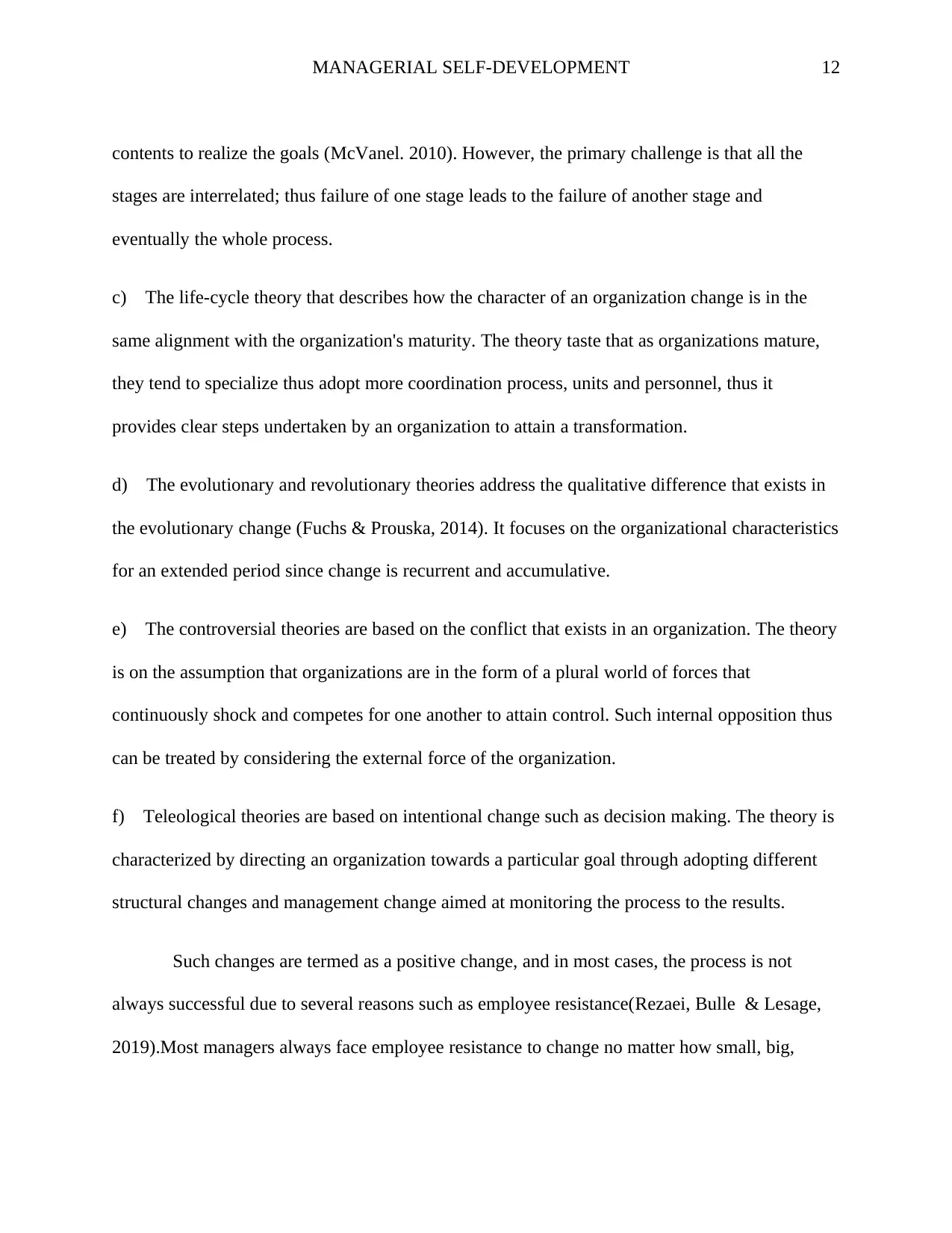
MANAGERIAL SELF-DEVELOPMENT 12
contents to realize the goals (McVanel. 2010). However, the primary challenge is that all the
stages are interrelated; thus failure of one stage leads to the failure of another stage and
eventually the whole process.
c) The life-cycle theory that describes how the character of an organization change is in the
same alignment with the organization's maturity. The theory taste that as organizations mature,
they tend to specialize thus adopt more coordination process, units and personnel, thus it
provides clear steps undertaken by an organization to attain a transformation.
d) The evolutionary and revolutionary theories address the qualitative difference that exists in
the evolutionary change (Fuchs & Prouska, 2014). It focuses on the organizational characteristics
for an extended period since change is recurrent and accumulative.
e) The controversial theories are based on the conflict that exists in an organization. The theory
is on the assumption that organizations are in the form of a plural world of forces that
continuously shock and competes for one another to attain control. Such internal opposition thus
can be treated by considering the external force of the organization.
f) Teleological theories are based on intentional change such as decision making. The theory is
characterized by directing an organization towards a particular goal through adopting different
structural changes and management change aimed at monitoring the process to the results.
Such changes are termed as a positive change, and in most cases, the process is not
always successful due to several reasons such as employee resistance(Rezaei, Bulle & Lesage,
2019).Most managers always face employee resistance to change no matter how small, big,
contents to realize the goals (McVanel. 2010). However, the primary challenge is that all the
stages are interrelated; thus failure of one stage leads to the failure of another stage and
eventually the whole process.
c) The life-cycle theory that describes how the character of an organization change is in the
same alignment with the organization's maturity. The theory taste that as organizations mature,
they tend to specialize thus adopt more coordination process, units and personnel, thus it
provides clear steps undertaken by an organization to attain a transformation.
d) The evolutionary and revolutionary theories address the qualitative difference that exists in
the evolutionary change (Fuchs & Prouska, 2014). It focuses on the organizational characteristics
for an extended period since change is recurrent and accumulative.
e) The controversial theories are based on the conflict that exists in an organization. The theory
is on the assumption that organizations are in the form of a plural world of forces that
continuously shock and competes for one another to attain control. Such internal opposition thus
can be treated by considering the external force of the organization.
f) Teleological theories are based on intentional change such as decision making. The theory is
characterized by directing an organization towards a particular goal through adopting different
structural changes and management change aimed at monitoring the process to the results.
Such changes are termed as a positive change, and in most cases, the process is not
always successful due to several reasons such as employee resistance(Rezaei, Bulle & Lesage,
2019).Most managers always face employee resistance to change no matter how small, big,
⊘ This is a preview!⊘
Do you want full access?
Subscribe today to unlock all pages.

Trusted by 1+ million students worldwide
1 out of 17
Related Documents
Your All-in-One AI-Powered Toolkit for Academic Success.
+13062052269
info@desklib.com
Available 24*7 on WhatsApp / Email
![[object Object]](/_next/static/media/star-bottom.7253800d.svg)
Unlock your academic potential
Copyright © 2020–2026 A2Z Services. All Rights Reserved. Developed and managed by ZUCOL.




